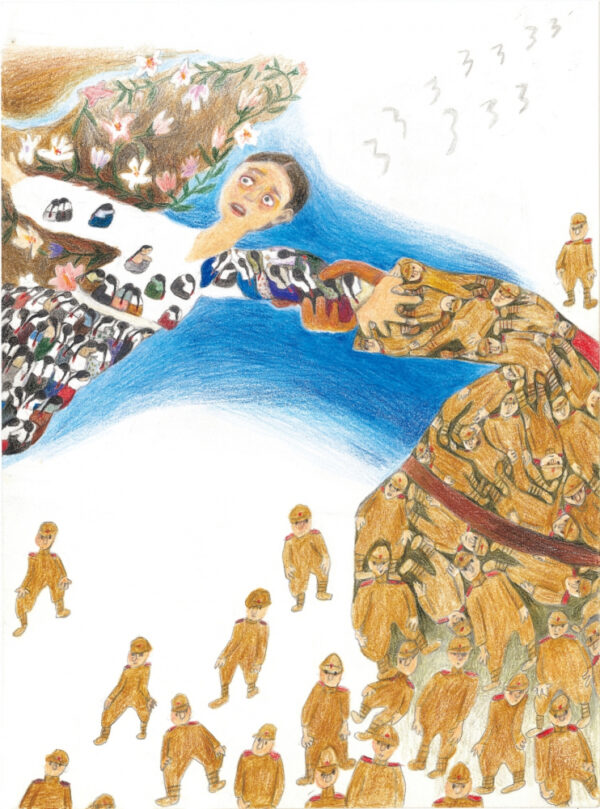Keywords: Trust, China, Society, Education
The 2022 Edelman Trust Barometer suggested that residents in countries not of western-style liberal democracy, including China, the United Arab Emirates, and Saudi Arabia, reported significant increases of overall trust in NGOs, business, government, and the media. China, in particular, saw the largest gain in trust from the previous year and topped this year’s ranking. In stark contrast, people living in Western democratic countries including Germany, the United States, and the Netherlands, showed large losses of trust in the same institutions of their countries compared to the previous year. In fact, the gap between the trust indexes for China and the US rose to an all-time high this year.[1] The contrast might be counter-intuitive for many westerners – major western news outlets have portrayed China to be the origin of the Coronavirus, a space for high business risks given Beijing’s recent clampdowns of education and tech industries, and a breeding ground for high social risks due to its still developing legal system. However, it is crucial to understand that trust is constructed very differently between China and the West, which can result in contrasting trust patterns especially in times of crises.
Psychologists have offered a cognitive explanation to how westerners and East Asians form social opinions very differently. Researchers suggested that East Asia’s collectivist culture push people living in the region to value group harmony and consider contextual factors in forming opinions with a holistic outlook. On the other hand, personal autonomy and formal logic tend to dominate when westerners form social opinions.[2] Studies have shown that the prominent theory of fundamental attribution error [AC1] – overstating personality factors but ignoring contextual factors when explaining others’ situations – is more inherent among western individuals and is less observed in East Asian cultures.[3] In the context of social crises such as the COVID-19 pandemic today, it is possible that the communitarian-oriented East Asians take into consideration multiple contextual factors, ranging from rapid virus mutations to complex social challenges of implementing public health measures when cases surge or policy responses lag. In contrast, Westerners may attribute ineffective pandemic controls to the lack of governing abilities or even ill intentions of individual politicians, political parties, and the media, and therefore trust them less. In such times of distress, the underlying cognitive differences between the West and more communitarian societies may push the disparity of trust levels towards institutions larger than in normal times. In addition, the communitarian perspective of East Asians may also imply that the unprecedentedly high institutional trust in China means a strong sense of collective confidence in ideological, social, and political superiority
Academics have noted that the Chinese mainstream media and social rhetoric rely heavily on a sense of “othering”.[4] Much similar to what Edward Said coined as “orientalism” – a flexible cultural projection upholding positional superiority of the self over the other[5] – the opposition between the Chinese self and the foreign other in contemporary Chinese media and social rhetoric highlights a comparative and positional nature of institutional trust opinions. I would argue that such social rhetoric renders a form of trust in Chinese institutions that manifests not only as citizens’ approval of the country’s policy practices and media reliability, but also as a feeling of “us” running political and social projects in a more efficient way than the “others”, otherwise understood as the belligerent West. From this perspective, the citizens’ high trust in Chinese institutions has a more profound implication in international power dynamics – it might be a sign that western institutions, political, educational, and cultural alike, are losing their influence and soft power more than ever in the Chinese society.
The West’s declining soft power in China is well demonstrated by another piece of recently released data. In the Institute of International Education’s annual report on international students’ enrollment in American universities, the US colleges and universities saw a sharp 15% decrease in total international student attendance, and a 45.6% drop in new student enrollment. Chinese students may still be the largest demographic group among international students, but have shown a 14.8% decline in the total number from the previous year.[6] Although many other confounding factors may be at play, the rapidly decreasing popularity of American colleges can partly be attributed to young Chinese people’s increased trustand pride in their home institutions, as well as the ideology, pedagogy, and philosophies that these institutions represent. Chinese students’ choice of staying in China, or studying overseas in countries other than the US, is concurrent with the divestment of American institutions in mainland China – exemplified by Harvard’s recent exit from Beijing and Taiwan’s attempt to displace Beijing-backed Confucius Institutes in the US with its own centers of Mandarin education.[7] As young people from the two sides of the world enjoy fewer opportunities in education exchanges, we may only start to see the decoupling of the two world powers in terms of the exchanges of information, ideas, and perspectives.
It is hardly a new practice to analyze trust and education as two highly correlated, if not causal, social parameters. Some scholars argue that education is “the single best predictor of social trust”.[8] Different from the West – particularly in Europe- where trust is generally positively correlated with education level, [9] Chinese sociologists suggest that higher educational attainment seem to cause a decrease in social trust in China, due to a heightened risk awareness. They point out that the concluded effect is particularly relevant to the transitional context of China, where social and political risks are widespread.[10] Their analysis, however, was based on a 2014 dataset. Edelman’s new data seems to illustrate otherwise – as China continues to promote higher education attainment, we now observe increased trust levels towards social institutions. The transitional social context studied by Wu and Shi may no longer be relevant and therefore their concluded effect breaks down. China’s far-reaching legal and social reforms have significantly enhanced the country’s legal and social welfare systems, as manifested by the nation’s first complete civil code which became effective in 2021, and a series of recent medical insurance reforms that have expanded access to healthcare. Given such development, one might argue that China has entered a new phase following the high-risk transitional stage in late 20th and early 21st century.
As China climbs up the rank in institutional trust and western democracies continue to see what Edelman referred to as a “collapse” of trust, what are diverging away might not only be the general public’s sentiments in their respective societies, but also the cognitive perspectives, social rhetoric, cultural contexts, and imagined positions of “us” versus “them”. As the COVID-19 pandemic and the ways in which different systems responded to it profoundly reshape societies around the world, coupled by the rising political tension between China and the West , trust patterns serve as an informative tool to shed light on the dynamics of belief, power, and international exchange.
Zerui Tian is a fourth-year undergraduate student at Columbia University studying Economics-
Mathematics and Public Health. His academic interests include education, social changes, and trust
especially in the context of contemporary China.
Bibliography
Borgonovii, Francesca, and Tracey Burns. “The Educational Roots of Trust.” OECD Education Working Papers, 2015. https://doi.org/10.1787/5js1kv85dfvd-en.
Winerman, Lea. “The Culture-Cognition Connection.” Monitor on Psychology. American Psychological Association, February 2006. https://www.apa.org/monitor/feb06/connection.html.
Fu, Ying. “Chinese Students in US Reflect on Covid Chaos.” VOA. Chinese Students in US Reflect on COVID Chaos, November 16, 2021. https://www.voanews.com/a/chinese-students-in-us-reflect-on-covid-chaos/6313821.html.
Kine, Phelim. “Taiwan’s Education Invasion.” POLITICO, October 14, 2021. https://www.politico.com/newsletters/politico-china-watcher/2021/10/14/taiwans-education-invasion-494693.
Lams, Lutgard. “Othering in Chinese Official Media Narratives during Diplomatic Standoffs with the US and Japan.” Palgrave Communications 3, no. 1 (2017). https://doi.org/10.1057/s41599-017-0034-z.
Morris, Michael W., and Kaiping Peng. “Culture and Cause: American and Chinese Attributions for Social and Physical Events.” Journal of Personality and Social Psychology 67, no. 6 (1994): 949–71. https://doi.org/10.1037/0022-3514.67.6.949.
Rep. 2022 Edelman Trust Barometer. Edelman, 2022.
Said, Edward W. Essay. In Orientalism, 7. London: Penguin Books, 2003.
[1] “2022 Edelman Trust Barometer” (Edelman, 2022).
[2] Lea Winerman, “The Culture-Cognition Connection,” Monitor on Psychology (American Psychological Association, February 2006), https://www.apa.org/monitor/feb06/connection.html.
[3] Michael W. Morris and Kaiping Peng, “Culture and Cause: American and Chinese Attributions for Social and Physical Events.,” Journal of Personality and Social Psychology 67, no. 6 (1994): 949-971, https://doi.org/10.1037/0022-3514.67.6.949.
[4] Lutgard Lams, “Othering in Chinese Official Media Narratives during Diplomatic Standoffs with the US and Japan,” Palgrave Communications 3, no. 1 (2017), https://doi.org/10.1057/s41599-017-0034-z.
[5] Edward W. Said, in Orientalism (London: Penguin Books, 2003), 7.
[6] Ying Fu, “Chinese Students in US Reflect on Covid Chaos,” VOA (Chinese Students in US Reflect on COVID Chaos, November 16, 2021), https://www.voanews.com/a/chinese-students-in-us-reflect-on-covid-chaos/6313821.html.
[7] Phelim Kine, “Taiwan’s Education Invasion,” POLITICO, October 14, 2021, https://www.politico.com/newsletters/politico-china-watcher/2021/10/14/taiwans-education-invasion-494693.
[8] Eric M. Uslaner, “Trust but Verify: Social Capital and Moral Behavior,” Social Science Information 38, no. 1 (1999): 29-55, https://doi.org/10.1177/053901899038001002.
[9] Francesca Borgonovii and Tracey Burns, “The Educational Roots of Trust,” OECD Education Working Papers, 2015, https://doi.org/10.1787/5js1kv85dfvd-en.
[10] Cary Wu and Zhilei Shi, “Education and Social Trust in Transitional China,” Chinese Sociological Review 52, no. 2 (2019): 115-143, https://doi.org/10.1080/21620555.2019.1665995.








